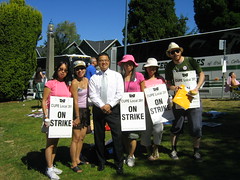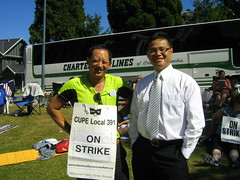Globe & Mail: Fiona Tinwei Lam has an essay about her music, her mother and dementia
Fiona Tinwei Lam was a finalist for the Vancouver Book Prize in 2003 for her poetry collection “Intimate Distances. Over the years we have become friends, and have shared our joy of Robbie Burns poetry, things Scottish, and discovered we were related through shared cousins.
Fiona was born in Scotland, moved to Canada as a young child, and has been a guest for both Gung Haggis Fat Choy: Toddish McWong's Robbie Burns Chinese New Year Dinner and also the Gung Haggis Fat Choy World Poetry readings. She has a younger sister who is a librarian, and whom once paddled on the Gung Haggis Fat Choy dragon boat team.
I heard about when Fiona's mother was moved to a care home, as her sister Shona gave me some of their mother's old accordion music. I regret that I was never able to play my accordion for their mother, as she used to play accordion in addition to piano.
The following is a very touching story that Fiona has written for the Globe & Mail.
http://www.theglobeandmail.com/servlet/story/LAC.20070828.FACTS28/TPStory/?query=Fiona+Lam
Playing for time
Although dementia often made my mother's speech
nonsensical, she could sustain a wonderful musical dialogue through
rhythm, tempo and volume
FIONA TINWEI LAM
August 28, 2007
I used to wake up some mornings as a teenager to the sounds of my mother playing the piano. But it was never Rustle of Spring or a gentle Minuet in G. Rather, it was the thunderous chords of Chopin's Funeral March. Either it was time to get up, or someone – probably me – was in deep trouble.
My petite mother would be perched over the keyboard, small hands
hammering down, creating sounds that made the room shake. If I tried to
close the door, she'd only open it again and return to the piano to
play even louder.
What my mother played always signalled her mood. A waltz meant
all-clear. A nocturne meant she needed to be left alone. But the
opening bars of the Funeral March spelled doom and had me racing for cover.
It was expected that I take piano lessons and piano exams, even
stumble through recitals, despite my mortification. Worse yet was the
year I was required to play the national anthem at high-school
assemblies.
One time, I misplaced the score. As I had played it so often, and
almost had it memorized, I thought I could manage. After everyone stood
up to sing, I began to play. When I reached “the True North strong and
free,” my panicked fingers faltered and stopped. People kept singing,
but the right notes eluded me. It happened again another time. I
decided I'd had enough of the piano.
After I left home, my mother had to retire early because of
deteriorating eyesight. Eventually, she couldn't read music. I hardly
noticed this, as she had committed so many pieces to memory.
She then developed Alzheimer's disease. Her repertoire began to
shrink along with the rest of her memory. But it didn't stop her. Once,
while we were visiting a care facility, my mother spotted an ancient
upright piano in the corner of the room. She marched over faster than
you could say Battle Hymn of the Republic, and launched into a medley of pub tunes intermingled with hymns, ending with a rousing rendition of Ten Little Indians.
I smiled wryly at the doctor as she arrived. “Sorry about this.”
“No one minds! It's wonderful that your mother still plays!” She went over to lavish her with praise.
Delighted with her audience, my mother played on.
As I watched song after song evaporate from her memory, I decided to
take up lessons again as an adult. But my performance anxiety was
almost insurmountable. At the introductory audition with the new
teacher, I tried to avoid playing a single note.
“Do I have to actually play?” I asked the teacher in desperation.
When I finally learned one of my mother's former pieces, the adagio from Beethoven's Pathétique
sonata, I played it for her. She listened for a while, nodding but
looking confused. After a few moments, she stood up: “Can I go home
now?”
Other attempts failed as well. Classical music just couldn't keep
her attention. I resorted to Christmas carols, whatever the season. I'd
urge her to clap or la-la along, trying to recover even a small portion
of the mother I had known growing up.
Later, I started playing the piano on my mother's secure floor at her care facility, sight-reading and stumbling my way through Red River Valley and Tea for Two.
Slowly, the other residents would find their way over from the TV
lounge. A few (usually mute) residents would suddenly start to sing;
others would even dance. My mother would pat my shoulder appreciatively
or pound out the time on the dining table. One time, she stood up at
the end of a song to applaud.
As my mother's dementia deepened, our family arranged private
one-on-one music therapy for her. Although my mother's speech was often
nonsensical, she could sustain a wonderful musical dialogue through
rhythm, tempo and volume that would deeply satisfy and calm her.
During my mother's last weeks, as she lay unconscious in palliative
care at the hospital after suffering a stroke, I talked to her, held
her hand, read to her, played her favourite tunes on the CD player. But
it didn't feel like enough.
So one day, I started to sing, self-consciously, quietly, so no one outside the room could hear: “Now
you are come, all my cares are remov'd./ Let me forget that so long you
have rov'd./ Let me believe that you love as you loved./ Long, long
ago./ Long ago.”
Suddenly, it felt as though my mother were singing to me, even while
I was singing to her. Every phrase became clear and alive. Years of
occasional tension, of living on opposite sides of the country, a
decade of dementia – it all fell away, leaving only the essential
truths.
Recently, I've been searching for a piano of my own. In stores, I
look around furtively to ensure no one's around, choose a piano and sit
down to play Chopin's Funeral March. The major piano stores must know me as the Morbid One.
Although I doubt I'll ever learn a third of my mother's extensive
classical repertoire, I'm going to make the effort, piece by piece.
It's my way of remembering her – not so much how she telegraphed her
dark moods when I was growing up, but how she could create such beauty
through her hands.
Fiona Tinwei Lam lives in Vancouver.











 Paul Whitney, City Librarian, with picket captain Alexis Greenwood and library employee/accordionist Todd Wong
Paul Whitney, City Librarian, with picket captain Alexis Greenwood and library employee/accordionist Todd Wong
 Tom Hansen, retired library worker, former union organizer and former VPL board member comes to give support.
Tom Hansen, retired library worker, former union organizer and former VPL board member comes to give support. 